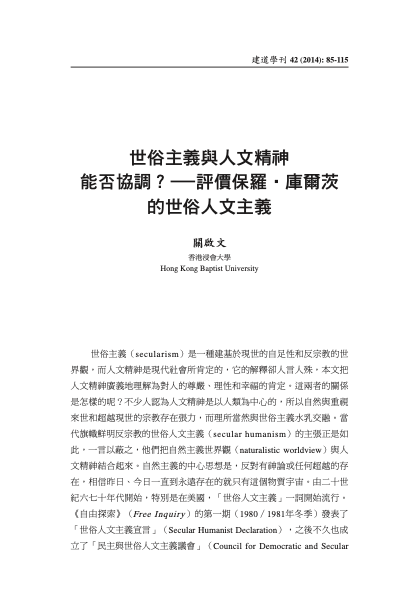世俗主義與人文精神能否協調?——評價保羅‧庫爾茨的世俗人文主義/關啟文
關啟文
撮要
世俗主義是一種建基於現世的自足性和反宗教的世界觀,而人文精神廣義 地可理解為對人的尊嚴、理性和幸福的肯定。世俗人文主義則把自然主義世界 觀與人文精神結合起來。本文首先會以美國哲學家庫爾茨(Paul Kurtz)為代表人物,詳細闡釋世俗人文主義的思想,第二部分則作出批判性的評價,我會論證:人文精神本有很多可取之處,但把它種植在自然主義的泥土上,是難以成功的。例如:世俗人文主義把道德建基於人類的理性和經驗上,然而理性和經驗並不真箇能為道德的無上律令提供穩固根基。世俗人文主義的理論不單有不少難以疏解的張力,而且在實踐上也容易導致人文精神的扭曲。
ABSTRACT
Secularism is an anti-religious worldview which affirms the self-sufficiency of the secular world. “Humanistic spirit” is broadly interpreted as the affirmation of the dignity and rational nature of human beings, and an emphasis on their well-being. Secular humanism is a system which tries to combine the naturalistic worldview with the humanistic spirit.
This article will first provide a detailed exposition of the tenets of secular humanism, taking the system of the American philosopher Paul Kurtz as the representative. Then the article will critically examine secular humanism. I will argue that despite the merits of the humanistic spirit, it is hardly feasible to root the humanistic spirit in the soils of naturalism. For example, secular humanism tries to use human reason and experience as the foundation of morality. However, human reason and experience cannot really ground the categorical imperative required by morality. Moreover, secular humanism does not only suffer from many insoluble contradictions theoretically, it will also easily lead to the distortion of the humanistic spirit in practice.
原載於《建道學刊》42期(2014年7月),頁 85-116。
Latest Articles
新手牧者研究計劃(三):新手牧者的身心靈狀態 / 盧慧儀
2025 年 11 月 19 日
個體與關係:滕近輝思想中「深化」的靈性觀 / 倪步曉
2025 年 11 月 18 日
香港九龍塘基督教中華宣道會之起源和發展史/陳智衡
2025 年 10 月 20 日
Highlights
[電子書]困境與抉擇:「建道研究中心30週年誌慶」跨學科研討會論文集/廖炳堂、倪步曉主編
2025 年 1 月 2 日
從梧州到長洲:建道神學院125年的挑戰與恩典 / 陳智衡
2023 年 10 月 1 日
微小教會的見證/高銘謙
2023 年 6 月 1 日







